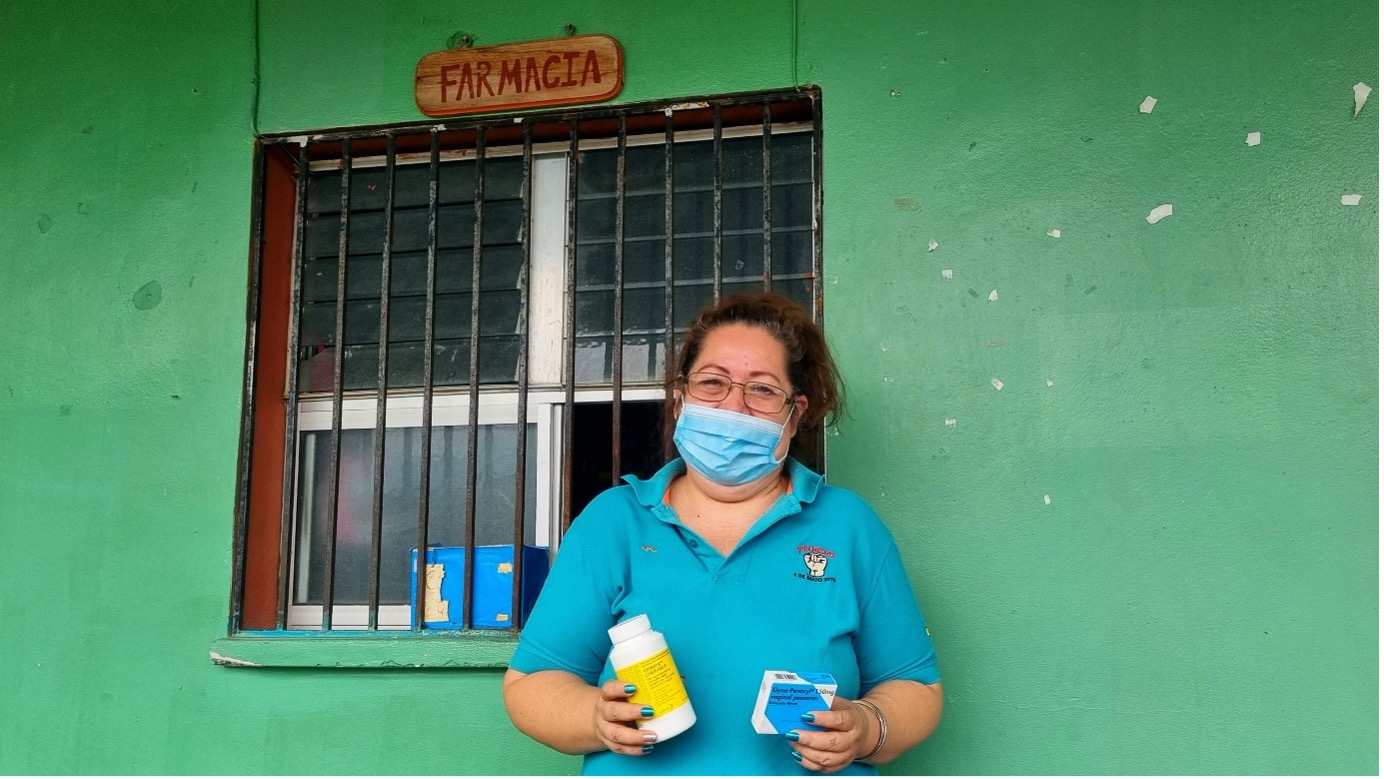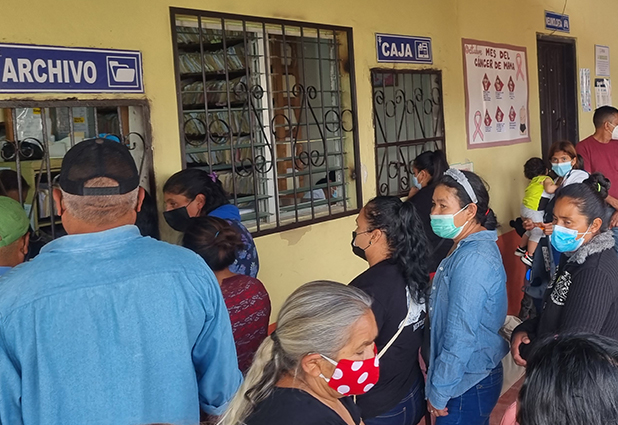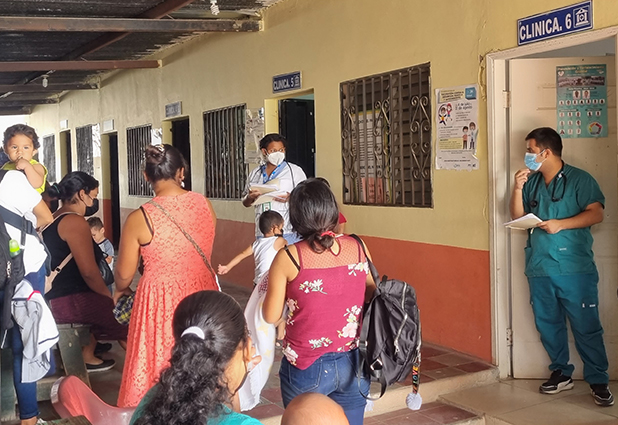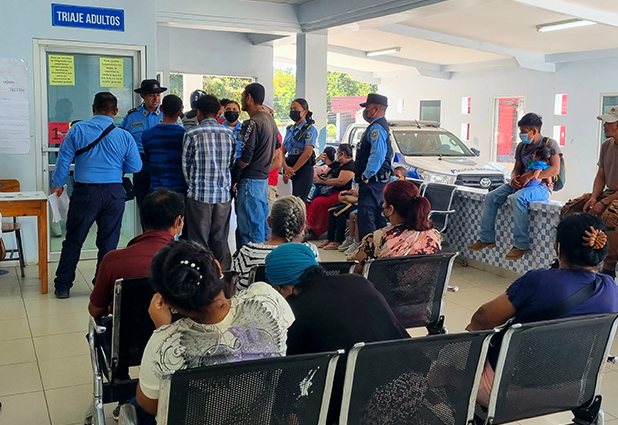

Creating a better healthcare reality in Honduras
Health conditions in Honduras are stark. Of its population of over 10 million people, it is estimated that 18% do not have access to any healthcare services. The ramification of such a large number (over 1.5 million) of people not being able to treat emerging and underlying conditions is uncertainty and insecurity. This state of affairs is exacerbated by the fact that informal employment makes up 83% of employment, meaning job security is tenuous and those currently able to access healthcare could be medically disenfranchised suddenly and without recourse.
The problem of accessing healthcare is pronounced in rural areas, in which facilities are frequently far away from patients and poorly stocked. There is a limited presence of health personal in the country, with only 0.3 physicians existing per 1,000 people, compared to the UK’s figure of 5.8. However, as most of these workers operate in the cities, this scarcity is more keenly felt in rural areas. Furthermore, migration of medical professionals out of the country is common, meaning that long-term medical infrastructure is hard to come by for most of the population. For citizens of Honduras living in rural areas, both geographical and financial barriers to healthcare access are keenly felt and needs frequently go unmet.
Maribel's story highlights the difficulty faced by those living in rural areas as well as the value of our work.
Maribel is 71 years old. She told us her story in her own words:
“I live in a village about 40 minutes walk away. I live with my brother, niece, and my niece’s two young children. I came here today on foot and left my home at 8am to be here early for the clinic. I come to the clinic regularly to get medicine for my high blood pressure. I was diagnosed with hypertension many years ago when a medical brigade came to my community. At the time I was suffering from severe headaches and couldn’t catch my breath.
Even though I try and keep it under control, sometimes I have a hypertension crisis and I end up in hospital. This has happened many times over the years. Usually then the hospital would give me a new supply of medications if I had run out. Getting to the hospital was never easy – I had to walk to another community where I could try to get a ride in a pick-up truck down to the city.
For the past few months, I’ve been coming to this clinic for my medication. When they have some in stock, that’s really good because they give it to me for free. I appreciate this because I don’t have an income. When they don’t have any, I have to purchase it. It costs 60 Lempira [around £2 GBP] for one month’s supply.
At the hospital they told me that it is very risky not to take the medication, that if I don’t take the tablets then I may have a heart attack, so I know it is important. I don’t have money for medicines, so I must ask my niece or nephew to help me pay for it. I never know when I’m coming here what I will find. Those of us with hypertension wish that the medicines were always here. Today I’ve arrived and they’ve given me 2 months’ worth of medicines. I’m really grateful."
The silent epidemic
Another structural difficulty which poses a major challenge for the health system in Honduras is non-communicable diseases (NCDs). More than seven in ten premature deaths are attributed to NCDs, while heart disease and strokes are the two leading causes of death in the country. Fatality, however, is not the only problem, with many living with life-altering illnesses without access to treatment. The WHO estimates that 5% of the adult population in Honduras have diabetes and that around half of those do not have a diagnosis or an appropriate treatment plan. Surveillance is an incredibly important part of diabetes treatment, and this is impossible in cases which are undiagnosed or in which necessary treatment is not being provided. The current structure of the Honduran health system makes surveillance incredibly difficult, while it is not uncommon for households to have no savings, so any unexpected bill, including for health costs, can prove insurmountable. The medication metformin is important in treating diabetes, yet most patients are not in a position in which they can afford it.
As part of our work in Honduras, IHP supplies metformin, in addition to many others. In the last two years, IHP has sent a total of over 4.3 million treatments to Honduras, lessening the number of people having to choose between food and healthcare.
One person in Honduras living with an NCD who we have been able to help is Juana, a patient at El Socorro clinic which is in a rural area and has only one doctor.
A year ago, the clinic began receiving a donation of Metformin [from IHP] which meant I could come here and get it for free. This lifted such a burden from me, not having to find the cost each month.


Juana is 53 years old, and has four children and three grandchildren. She lives close to the clinic with one of her daughters. When we spoke to her, she had come to the clinic to participate in the monthly group for diabetic patients.
"I was diagnosed with diabetes two years ago. It was just after I had had covid. At the time I was feeling uneasy, and my body was always craving sweet things. It got to a stage where I found myself even wanting to add more sugar to my coke! I was often thirsty, and my lips were very dry and cracked.
I decided to go to a medical consultation where the doctor sent me to get my glucose and cholesterol levels checked. The results came back, they showed my blood sugar levels were abnormal and I was diagnosed with diabetes. I was aware I was prediabetic but that was many years ago so hearing I was now diabetic was a bit of a shock.
The doctor gave me some advice on changing my diet and prescribed me a drug called Metformin. The clinic didn’t have any in stock so I was told I would have to buy it myself from somewhere else. I went to a private pharmacy, and it was really expensive. I paid 900 Lempira (about £30) which was only for one month’s supply. This was pretty difficult for me as I hadn’t expected this cost.
At the beginning, one of my brothers was helping me but as it was a chronic disease with an ongoing cost, he couldn’t keep on paying more. I began a small business selling frozen popsicles to generate some money to try and pay for it, but that didn’t work after a while. It was very stressful not knowing each month how I was going to pay for the next lot of medicine. When I was having to pay for it, I suffered depression knowing that I have only limited resources and that this is a long-term, chronic disease.
But then a year ago, the clinic began receiving a donation of Metformin (from IHP) which meant I could come here and get it for free. This lifted such a burden from me, not having to find the cost each month.
Also, the drug I bought from the pharmacy gave me headaches, but the one donated by IHP doesn’t have any side effects. The medicine makes me feel better. I know there are risks to not taking the medicine and I want to take care of my health and continue to live. My children and my grandchildren are my motivation. I am very thankful for those who are providing this drug, God Bless you all."
The resilience of Honduras' healthcare workers and patients
Yet the economic fabric of Honduras is such that, for all our work, chronic need remains. Agriculture and forestry are major sources of livelihoods, especially in rural areas, with agriculture constituting 14% of GDP. This heavy reliance on agriculture creates economic uncertainty as Honduras is dependent on weather conditions to secure income, increasing the potential threat of adverse and unexpected weather events. Additionally, the most recently available data(which was before the country was affected by both the pandemic and double hurricanes in 2020, leading to a loss of 400,000 jobs) found that over 4 million people, almost half the population, lived in poverty on less than $5.50 a day and 25%of the population lived in extreme poverty. Though healthcare is a human right, the reality for many in Honduras is that it has become a luxury. A luxury many are unable to afford. Yet, through the donation of necessary medical supplies, patient needs can still be met.
We found this when we visited Bessie, a nurse at Gustavo Boquin Clinic, the biggest health unit in Siguatepeque. It is a large and busy clinic with 9 doctors, serving a population of around 10,000 people.

She told us her experience in her own words, detailing how economic troubles often prevent patients from accessing treatment:
“We see around 360 people a day at this clinic. The majority of them have conditions that need to be treated with medicines. On average, out of every five prescriptions, we are able to provide three of them. When the clinic doesn’t have the medicine available, the patient is told to buy it. But in most cases, they will not be able to do that as they don’t have the money. So, then they have to come back again for the same consultation until the medicine is here. Many patients must come here repeatedly.
It is costing them time and sometimes money to travel here. And it adds to the pressure on the clinic – you can see how many patients are here, some of them would not need to be if they had not had to return because of a stockout. It also impacts on the health of the patient when they aren’t treated when they need it. Sometimes they return with worse symptoms.
Recently I was attending a patient with pneumonia. I couldn’t treat him as we did not have the right medicine, so he came back again another day. By then he was seriously ill and needed a hospital, so I had to refer him to Santa Teresa in the city. Other patients arrive with chronic diseases. They come with the mentality that the clinic is going to resolve their health issue, but often that’s impossible until their condition worsens enough for them to be admitted to hospital, and then their illness can be treated.
As a medic it is troubling. I find myself at a crossroads. When I know my patient needs medication and doesn’t have the means to purchase it, I feel conflicted watching them leave. We appreciate the donated medicines from IHP. They help us fill in the gaps.”
Waiting for relief
As Bessie’s account demonstrates, there are profound healthcare consequences of an economic climate such as that which exists in Honduras. Parents are unable to provide their children with an adequate amount of food. Stunting is recorded in 23% of children under 5. This is compared to the region average of 11%. Yet economic progress is hard to achieve, especially considering the impact that gang violence and organised crime has on the country. Gang activity is a leading cause of population displacement in Honduras and exacerbates the economic insecurity faced by many in the nation. Issues are particularly acute in urban areas, with high rates of homicide and violence. Interpersonal violence is the third highest cause of death in Honduras. More indirectly, gang activity and crime are lethal in that they inhibit free movement of people, impacting on their ability to attend health facilities, or for children to attend school. Thus, the economic and social framework of Honduras is such that health conditions are endemic and logistically very difficult to solve.
This poor health infrastructure can be seen statistically but also visually through the proliferation of queues throughout the country. This forms another barrier to healthcare as waiting times are pronounced and treatment and diagnoses are frequently rushed.
There are a variety of factors contributing towards the existence of these queues. Chief amongst which are the following:
1. High rates of urbanisation mean that population size in cities is outgrowing capacity.
2. Rural health centres are understaffed with only limited services, causing queues as needs are not quickly met.
3. Some specialisations – such as for heart and lung treatment – are only available in the nation’s capital, meaning patients travel from all over the country, leading to queues and delays.
Regarding the consequences of these queues, this anti-bribery sign at the Escuela Universitario Hospital, Tegucigalpa indicates the risk of people being driven to offer bribes to try and receive treatment more quickly and bypass the long queues so customary of the Honduran healthcare system.
Furthermore, in the image we see a patient being treated outside the facility due to overcrowding at Dr Roberto Suavo Cordova Hospital. The build-up of queues in the Honduran health system therefore directly correlates with worse healthcare outcomes, with patients not being able to receive the quality of care they need.
One medical worker seeking to alleviate the problems posed by the queues in Honduras’ healthcare system is Dr Kenia. She joined Santa Teresa hospital nine months ago and manages the hospital triage. All patients pass through here. She assesses whether they should be sent to the emergency room, another part of the hospital for less critical treatment, or refers them to another facility if they can’t be treated here.
“On average 80 patients pass through here each day. The most common conditions we see are heart issues or respiratory illness. If it is something straightforward, I may prescribe treatment myself, but they will be admitted if there is something more serious or a complication. Many patients come here after they had first gone to their local health clinic. Those facilities do not have labs, and often don’t have the medication for the diagnosed condition, so the patients then have to travel here for treatment.
Sometimes then we also are out of stock. In that situation I can only write them a prescription and tell them they need to go and find it elsewhere. When this happens, I wish I had the money myself to buy it for them. Most of the medicines I have to prescribe are so expensive and most of the patients here are of limited economic status. I know it is unlikely that they will be able to purchase what they need and then that may mean their health condition worsens. For example, we’ve had patients with high cholesterol who need statins, and I’ve had to send them away knowing that there is a higher risk of them having a heart attack if their blood vessels become clogged”.
These queues are but one manifestation of the institutional problem Honduras’ healthcare system faces. They are not themselves the problem but rather a symbolisation of it. IHP believes in the necessity of eradicating all suffering worldwide due to a lack of access to healthcare and in the effectiveness and viability of freely supplying people with healthcare supplies. We are currently operating in Honduras alongside our sub recipient, Proyecto Aldea Global (PAG), to deliver medicine and protective equipment, cleaning supplies and materials for various health facilities. Our operations, we hope, will serve those in need and keep stocks replenished at facilities across the country.
One person used to operating in the conditions of Honduras’ healthcare system is Consuelo.

Under the administration of the new government, many people have been moved around in their roles. Consuelo is an accountant by trade but was assigned this year to be the head of a pharmacy in a medical clinic. She didn’t have any say on where she was posted and has received no training in how to manage a pharmacy.
“Most of the patients leave with at least one medicine missing because we don’t have it in the pharmacy. When I have to turn away a patient without medicine, their countenance becomes very sad. I understand because I know they are of low income and will not be able to afford to buy the drugs themselves. The clinic charges a symbolic fee to come here (2Lempira – about 6 pence) and some of them can’t even afford to pay that.
It is always a difficult situation and sometimes I end up with tears in my eyes when we are talking. I know that without treatment the child or adult may develop complications and may end up in the hospital with a much more severe condition. How can you not feel compassion when you know it is not their fault? Anyone could go through this.
I have not received formal training for this role, but I do my best. It is very rewarding to serve others. I live in this community and there are lots of needs. Patients have to travel very far to attend this unit, some over 2 hours’ walk away. The roads are very rough and so ambulances struggle to travel around and that also puts the patients inside at risk.“
The situation in Honduras does not immediately evoke optimism. The World Health Organisation (WHO) has rated the national health system of Honduras as position 131 out of 191 countries. Conditions on the ground reflect this ranking. However, much work is actively being carried out to improve circumstances. Each of these stories demonstrate the transformative power healthcare has to improve, save and change lives. Though the obstacles are great, change occurs through us all working together, one step at a time, with the belief that healthcare is a right and that incredible progress can and will be achieved, so long as we continue to act.


Help us deliver access to medicine all year round
Join our giving community and help us transform the health outlook of families every single month.
.png)
See how your donation makes a difference
£5 can help us to give 15 people treatment
£20 will provide 16 children with antibiotics
£100 will provide 83 pregnant women with life saving medicine.
£450 will provide am emergency medical kit to 60 families.
Whatever you give, you could be making a life-changing, even life-saving difference to someone every month.
See how your donation makes a difference
£5 is enough to source and send £600 worth of medical supplies a year to people in need; enough to help approximately 50 people around the world.
£10 is enough to source and send £1,200 worth of medical supplies a year to people in need; enough to help approximately 100 people around the world.
£25 is enough to provide around 750 treatments in a year, helping approximately 250 people in need; and for some, is the difference between life & death.
£100 is enough to provide medicines and supplies for approximately 1,000 people a year living in disaster-hit and vulnerable communites.
Whatever you give, you could be making a life-changing, even life-saving difference to someone every month.

Help us deliver access to medicine all year round
From fundraising to delivering medicines, you can also support our vital work in other ways.
See other ways to help











